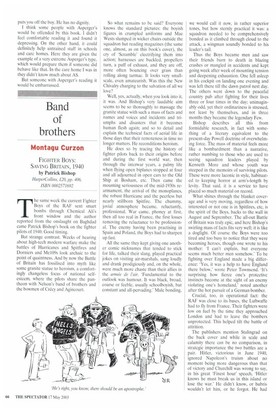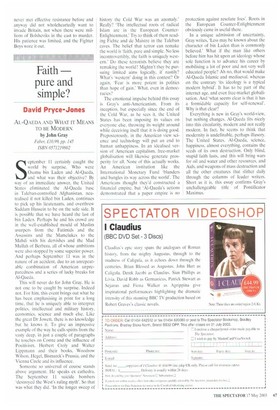Band of brothers
Montagu Curzon
FIGHTER BOYS: SAVING BRITAIN, 1940 by Patrick Bishop HarperCollins, £20, pp. 406, ISBN 0002571692 The same week the current Fighter Boys of the RAF sent smart bombs through Chemical Ali's front window and the author reported from the onslaught on Baghdad came Patrick Bishop's book on the fighter pilots of 1940. Good timing.
But strange contrast. Weeks of hearing about high-tech modern warfare make the battles of Hurricanes and Spitfires and Dorniers and Me109s look archaic to the point of quaintness. And by now the Battle of Britain has fossilised into myth like some granite statue to heroism, a comfortingly changeless focus of national selfesteem, where the pilots share the pantheon with Nelson's band of brothers and the bowmen of Crecy and Agincourt. So what remains to be said? Everyone knows the standard pictures: the boyish figures in crumpled uniforms and Mae Wests slumped in wicker chairs outside the squadron hut reading magazines (the same one, almost, as on this book's cover), the cry of 'Scramble' electrifying them into action; harnesses are buckled, propellers turn, a puff of exhaust, and they are off, more often bouncing over grass than rolling along tarmac. It looks very smallscale, even amateurish. Was this the New Chivalry charging to the salvation of all we love?
Well, yes, actually, when you look into it, it was. And Bishop's very laudable aim seems to be so thoroughly to massage the granite statue with such a mass of facts and names and voices and incidents and triumphs and disasters that it becomes human flesh again; and so to detail and explain the technical facts of aerial life in those days that their remoteness in time no longer matters. He reconditions heroism.
He does so by tracing the history of fighter pilots back to their origins before and during the first world war, then through the interwar years, a palmy life when flying open biplanes stopped at four and all adjourned in open cars to the Old Ship at Bosham, etc. Then came the mounting seriousness of the mid-1930s rearmament, the arrival of the monoplanes, the robust Hurricane and the peerless but nearly stillborn Spitfire. The chummy, jovial atmosphere became, reluctantly, professional. War came, phoney at first, then all too real in France, the first losses removing the reluctance to be professional. The enemy having been practising in Spain and Poland, the Boys had to sharpen up fast.
All the same they kept giving one another comic nicknames that tended to stick for life, talked their slang, played practical jokes on visiting air-marshals, sang loudly and drank prodigiously and, on the whole, were much more chaste than their allies in the armee de lair. 'Fundamental to the outlook was humour. It was black, broad, coarse or feeble, usually sehoolboyish, but constant and all-pervading.' Male bonding,
we would call it now, in rather superior tones, but how sternly practical it was: a squadron needed to be comprehensively bonded as it climbed through cloud to the attack, a wingman soundly bonded to his leader's tail.
Thus the Boys became men and saw their friends burn to death in blazing crashes or mangled in accidents and kept going week after week of mounting tension and deepening exhaustion. One fell asleep in his cockpit on landing one evening and was left there till the dawn patrol next day. The others went down to the peaceful country pub after fighting for their lives three or four times in the day; unimaginably odd, yet their ordinariness is stressed, not least by themselves, and in three months they became the legendary Few.
Bishop describes all this from formidable research, in fact with something of a literary equivalent to the present-day Powell doctrine of overwhelming force. The mass of material feels more like a bombardment than a narrative, rather numbing to those who are used to seeing squadron leaders played by Kenneth More and whose youth was steeped in the memoirs of surviving pilots. These were more laconic in style, habituated to keeping horror at arm's-length by levity. That said, it is a service to have placed so much material on record.
What shines through the blanket coverage and is very moving, regardless of how interested or not one is in Spitfires, etc, is the spirit of the Boys, backs to the wall in August and September. The all-out Battle of Britain was truly epic, and here Bishop's swirling mass of facts fits very well; it is like a dogfight. Of course the Boys were too tired and too busy to notice that they were becoming heroes, though one wrote to his mother: 'I can't explain, but everyone seems much better men somehow.' To be fighting over England made a big difference: 'Yes, it was a help to have England there below,' wrote Peter Townsend. 'It's surprising how fierce one's protective instincts become at the sight of an enemy violating one's homeland,' noted another after the hot pursuit of a German bomber.
Crucial, too, in operational fact: the RAF was close to its bases, the Luftwaffe had to fly from France. Their fighters were low on fuel by the time they approached London and had to leave the bombers unprotected. This helped tilt the battle of attrition.
The publishers mention Stalingrad on the back cover and while in scale and calamity there can be no comparison, in strategic importance the two battles are a pair. Hitler, victorious in June 1940, ignored Napoleon's truism about no moment being more dangerous than that of victory and Churchill was wrong to say, in his great 'Finest hour' speech, 'Hitler knows he must break us in this island or lose the war.' He didn't know, or hubris wouldn't let him, or he forgot. He had never met effective resistance before and anyway did not wholeheartedly want to invade Britain, not when there were millions of Bolsheviks in the east to murder. His patience was limited, and the Fighter Boys wore it oat.



































































































 Previous page
Previous page